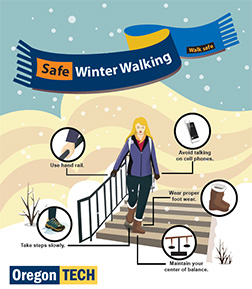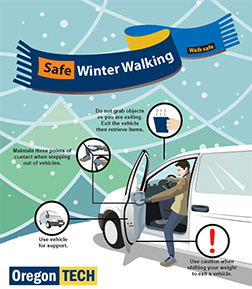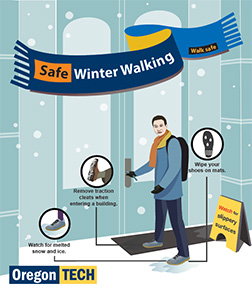Risk Management minimizes the risk exposures of Oregon Tech by providing risk consulting and risk services to the Oregon Tech community. Services include identifying sources of loss, assessing the impact, recommending risk solutions/techniques, assisting with implementation and monitoring the solution/technique for its effectiveness.
Winter Safety
During these snowy and icy weather conditions Oregon Tech would like to remind everyone to be safe while on campus. No matter how well the snow and ice are removed from campus sidewalks, parking lots and the surrounding streets, people will invariably encounter some slippery surfaces when walking outdoors in the winter.
Getting around on campus in icy conditions calls for planning, caution, and a little common sense:
- Dress warmly and wear boots with non-skid soles (avoid plastic and leather soles).
- Keep warm, but make sure you can hear what's going on around you. Wear a bright scarf or hat or reflective gear so drivers can see you, and whatever you wear, make sure it doesn't block your vision or make it hard for you to hear traffic.
- A heavy backpack or other load can challenge your sense of balance. Try not to carry too much—you need to leave your hands and arms free to better balance yourself.
- During the daytime, wear sunglasses to help you see better and avoid hazards. At night, wear bright clothing or reflective gear. Dark clothing will make it difficult for motorists to see you--especially if they aren't expecting you.
- When entering a building, remove as much snow and water from your boots as possible. Take notice that floors and stairs may be wet and slippery. Walk carefully.
- Be prepared to fall and try to avoid using your arms to break your fall. If you fall backward, make a conscious effort to tuck your chin so your head doesn't strike the ground with full force.
- Use special care when entering and exiting vehicles--use the vehicle for support.
- Streets and sidewalks that have been cleared of snow and ice should still be approached with caution. Look out for "black ice." Dew, fog or water vapor can freeze on cold surfaces and form an extra-thin, nearly invisible layer of ice that can look like a wet spot on the pavement. It often shows up early in the morning or in areas that are shaded from the sun.
Additional Resources
Safe Winter Walking

|

|

|
|---|
These posters were created by Iowa State University Environmental Health and Safety and we would like to thank them for granting Oregon Tech permission to use the posters for informational purposes.






